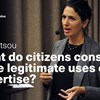user
Can AI be used to avoid discrimination during recruitment?
More and more businesses use AI – artificial intelligence – in recruitment. But what happens when they do so? The research project Can the implementation of artificial intelligence in the recruitment p, led by sociologist Moa Bursell, can give us some answers.
The Future of Housing and Technology in Japan – The Connected House Group Study Tour
The report describes experiences drawn from a study tour in Japan, June 2003. An important conclusion is that not only does the future of housing lay in technology, but technology is an integral part
Deep learning diffusion by infusion into preexisting technologies - Implications for users and society at large
in: Technology in Society. 63, 101396 Abstract:Artificial Intelligence (AI) in the form of Deep Learning (DL) technology has diffused in the consumer domain in a unique way as compared to previous gene, i.e., by being added to preexisting technologies that are already in use. We find that DL-algorithms for recommendations or ranking have been infused into all the 15 most popular mobile applications (apps) in the U.S. (as of May 2019). DL-infusion enables fast and vast diffusion. For example, when a DL-system was infused into YouTube, it almost immediately reached a third of the world's population. We argue that existing theories of innovation diffusion and adoption have limited relevance for DL-infusion, because it is a process that is driven by enterprises rather than individuals. We also discuss its social and ethical implications. First, consumers have a limited ability to detect and evaluate an infused technology. DL-infusion may thus help to explain why AI's presence in society has not been challenged by many. Second, the DL-providers are likely to face conflicts of interest, since consumer and supplier goals are not always aligned. Third, infusion is likely to be a particularly important diffusion process for DL-technologies as compared to other innovations, because they need large data sets to function well, which can be drawn from preexisting users. Related, it seems that larger technology companies comparatively benefit more from DL-infusion, because they already have many users. This suggests that the value drawn from DL is likely to follow a Matthew Effect of accumulated advantage online: many preexisting users provide a lot of behavioral data, which bring about better DL-driven features, which attract even more users, etc. Such a self-reinforcing process could limit the possibilities for new companies to compete. This way, the notion of DL-infusion may put light on the power shift that comes with the presence of AI in society.

Eri Bertsou: What do citizens consider to be politically legitimate uses of expertise?
Can democratic politics incorporate citizen demands for independent expertise in ways that boost legitimacy and trust in politics? Democratic governments worldwide face the dilemma of how to deal with
“Time to Abandon Swedish Women”: Discursive Connections Between Misogyny and White Supremacy in Sweden
International Journal of Communication 18(2024) Abstract This article explores the discursive linkages between violent misogyny and violent rightwingextremism in the popular Swedish online discussion foranonymous and relatively unmoderated commenting. Empirically, it focuses on thearticulations of misogyny and anti-feminism mapped onto extreme right ideology includingwhite supremacism in user comments posted across 16 Flashback threads. To analyze theextensive data set, we first drew on a collocation analysis of user comments (N = 20,359)scraped from a strategic selection of threads. From this sample we chose 36 combinationsto be considered for a closer reading. In the second analytical step, critical discourseanalysis coupled with the Essex School’s logics approach helped us unpack the logics ofconspiracy and male entitlement, as well as the fantasmatic projections of Swedish womenas both “race traitors” and “victims” at the heart of extreme right discourse in and beyondSweden today.
Eri Bertsou: Varieties of Expertise: What do citizens consider to be politically legitimate uses of expertise
Venue: Institutet för framtidsstudier, Holländargatan 13, 4th floor, Stockholm, and online Research seminar with Eri Bertsou, Assistant Professor of Political Science, University of St. Gallen (HSG).REG
The fast and furtive spread of AI by infusion into technologies that we already in use – a critical assessment
In Hanemaayer, A. (editor) Artificial Intelligence and Its Discontents. Palgrave. Abstract AI has often reached individuals covertly, rather than by their own choosing. Standard automatic version update
Homophily and Insularity Dynamics in an Echo Chambers: Computational Models for the Study of the Conspiracy Subculture in Facebook
Social Indicators Research Abstract The research focuses on developing a computational model (agent-based) to describe and analyse the structure and evolution of a conspiracy bubble within Facebook. Thedescriptiveexperimental
Proceedings of the Third International Conference on Hybrid Human-Artificial Intelligence
IOS Press. Frontiers in Artificial Intelligence and Applications (series) Preface This volume presents the proceedings of the 3rd International Conference on Hybrid Human-Artificial Intelligence (HHAI 20
Postdoctoral researcher studying the psychological significance of online recommendations
We are looking for a postdoctoral researcher in a project that aims to empirically investigate the psychological impact of online recommendation systems.








